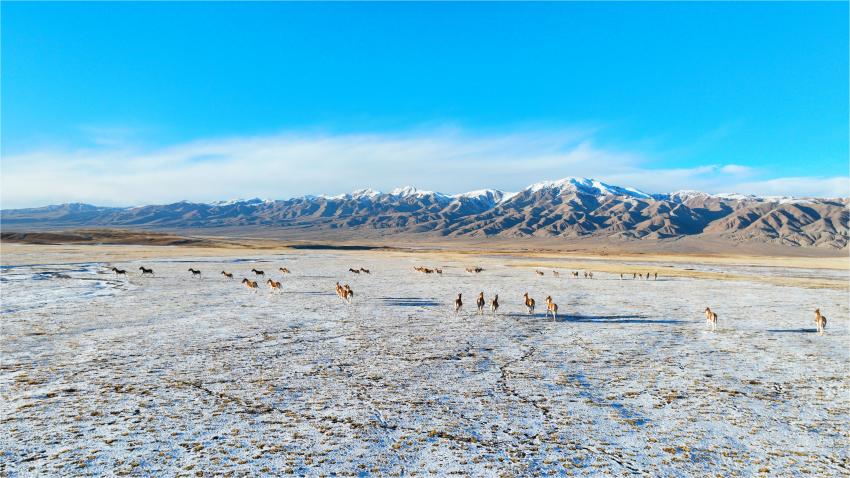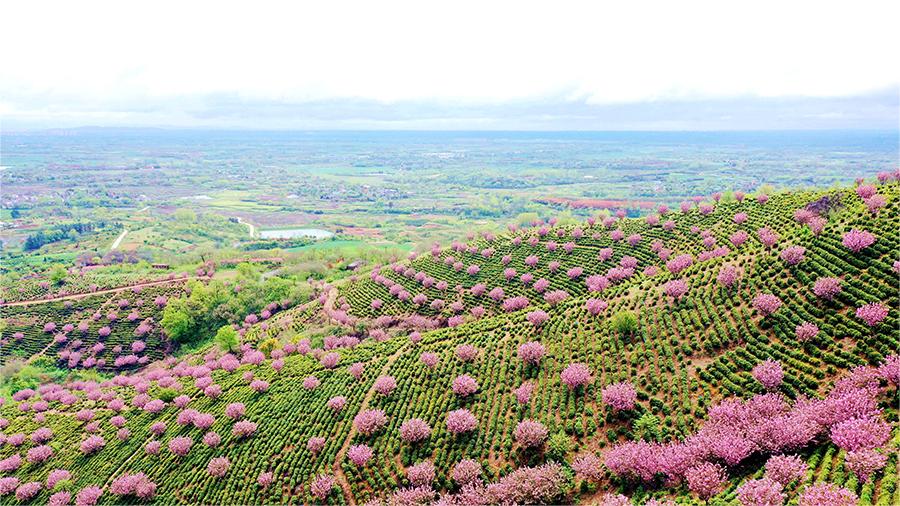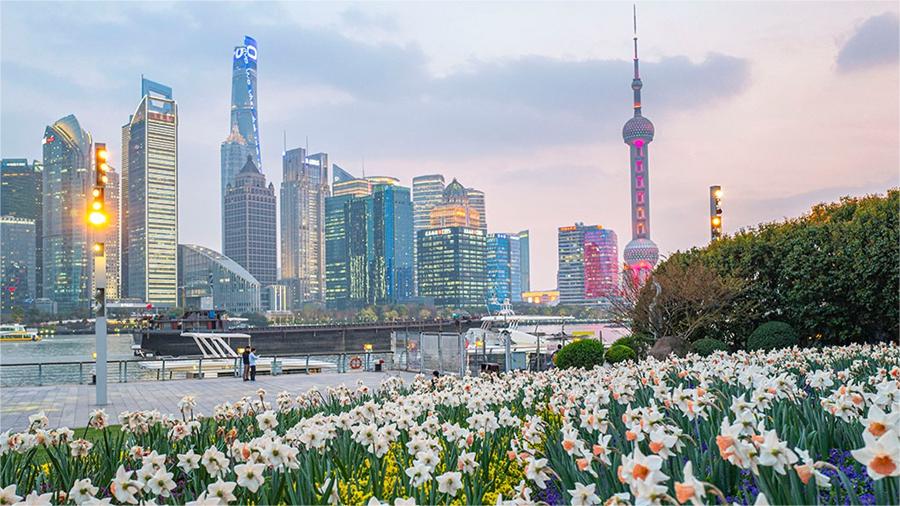Unbreakable bond spans decades
Editor's note: Amity between the people holds the key to sound state-to-state relations. China Daily will come out with a series of stories highlighting Chinese cities' special connections with sister cities, mutual understanding, trust and friendship between peoples of different countries and cultural backgrounds, and shining light on "city diplomacy".

From Wuhan's Yellow Crane Tower to a modern art museum in Duisburg, these landmark buildings narrate stories of the history of the sister cities. CHINA DAILY
The Chinese city of Wuhan and the German city of Duisburg joined hands in 1982 to become the first pair of sister cities between China and Germany. Decades have passed, and people still remember that this enduring friendship originated from a letter written by a German woman.
In the 1970s, Germany assisted in the construction of a cold-rolling steel plant in Wuhan. At that time, approximately 300 German engineers and their families lived in Wuhan, with the majority hailing from Duisburg.
One day, a German engineer and his wife took a walk along the Yangtze River. Seeing the scenery where the Han River meets the Yangtze River, the wife couldn't help but think of her hometown, Duisburg, which is situated at the confluence of the Rhine and Ruhr rivers and is also an industrial city.
Upon returning, she immediately wrote a letter to the then-mayor of Duisburg, urging for a sister-city relationship between Duisburg and Wuhan, according to the local Wuhan newspaper, the Changjiang Daily.
Wuhan is located at the confluence of the Yangtze River and the Han River in Central China. It is an important industrial city with an excellent geographical location and convenient transportation by land, water, and air.
Duisburg, on the other hand, is a significant industrial city in the Ruhr area of western Germany. Situated at the confluence of the Ruhr River and the Rhine River, it is a crucial water and land transportation hub in Europe. Additionally, Duisburg is home to the world's largest inland port — the Port of Duisburg.
"It was precisely because German friends who lived in Wuhan discovered that these two cities, whether in terms of geographical location or industrial structure, had such great similarities, that they felt a sense of home here, which prompted the two cities to desire to establish a sister-city relationship," said Wu Min, executive president of the German Federation of Hubei Associations.
On Oct 8, 1982, Wuhan and Duisburg officially became sister cities. Since then, the two cities have enjoyed close cooperation in various fields such as science and education, economy and trade, transportation, culture and tourism, health, gardening, and sports, achieving fruitful results, Wuhan's Mayor Cheng Yongwen said while meeting with a visiting delegation led by Soren Link, the mayor of Duisburg in March.
Cheng said that he hoped the two cities would further deepen exchanges and cooperation in a wider range of fields and at deeper levels. Adhering to the principle of mutual benefit and win-win cooperation, they aim to jointly promote more fruitful outcomes from the friendly interactions between the two cities, making greater contributions to the high-quality joint construction of the Belt and Road Initiative and enhancing the friendship between China and Germany.
In response, Link said Duisburg and Wuhan share a deep friendship and have broad prospects for cooperation. He hopes to continuously increase the intensity of exchanges, deepen practical and effective cooperation, and further compose a new chapter of cooperation between the two sister cities.
For over four decades, exchanges between these two cities have left many historical marks.
In 1984, Duisburg recommended the German expert Werner Gerich to provide technical consultation for the Wuhan Diesel Engine Factory, a State-owned enterprise. He was later appointed as its director, becoming the first "foreign factory director" in China after the reform and opening-up.
In 1987, Wuhan presented Duisburg with a gift, a Chinese-style garden. The Yingqu Garden, located within Duisburg Zoo, covers an area of approximately 5,400 square meters and was officially opened to the public in 1988, receiving great affection from the local people.
In Duisburg, elements of Wuhan can be seen quite often. In 2015, the German Federal Railway named a passenger train operating in the Ruhr area "Wuhan China Express", the first time in its history that it named a passenger train after a foreign city. Duisburg also named a street and the largest conference hall after Wuhan.
Since the year 2000, Duisburg has held an annual dragon boat race, a traditional Chinese paddling sport, which attracts about 3,000 local and global participants each year. Wuhan has also sent teams to participate in the competition multiple times.

The China-Europe Railway Express bound for Duisburg departs from Wuhan. XIAO YIJIU/XINHUA
Deep impression
For some Germans, the living experience in Wuhan has left a deep impression. Andrea Hoecker, a 30-year-old who has lived and studied in both Wuhan and Duisburg, said that Wuhan boasts many beautiful tourist attractions and stunning night views.
"The city is vibrant at night, offering opportunities to dine out, watch movies, participate in square dancing, sing karaoke, play mahjong, go shopping, get a haircut, and more. There are places to eat and drink around the clock, an experience she had never encountered before in Germany," she said.
Patrik Song, a German who married a woman from Wuhan, expressed that one of his most memorable experiences was visiting the night markets in Wuhan. He found it incredible to see a variety of delicious foods being prepared right in front of him.
"A warm night, having a cocktail and trying all kinds of foods that I never even saw in my life before was one of the greatest things I was able to experience in my life," he said. "And even here, people were so eager and happy to talk and know more about me — the thirst for knowledge and contact with people from other countries is huge and I would love to spend even more time in Wuhan."
As industrial cities, Wuhan and Duisburg have both made efforts to seek economic transformation and high-quality development. The China-Europe Railway Express, an important project under the Belt and Road Initiative, has become a significant driving force for their development and cooperation, especially after Chinese President Xi Jinping's visit to the city 10 years ago.
Xi visited Duisburg on March 29, 2014, during his trip to Germany. While welcoming the arrival of a freight train from China, Xi expressed hope that Duisburg would play a greater role in promoting cooperation between China and Germany, and China and Europe.
Link, who greeted Xi during the visit, said that with the train connections, Duisburg benefits directly from the Chinese projects and involvement in the region.
"Since Xi's visit, Duisburg has become an important logistics hub, with an increasing number of Chinese companies investing there. I believe that in the future, we will have even greater potential for cooperation with China," he said.
In 2015, the express starting from Wuhan extended its European terminal to Duisburg. Over the past decade, Duisburg has become the node with the widest coverage, the most frequent trains, and the highest volume and value of goods among the Western European routes for the China-Europe Railway Express.
At present, a majority of China-Europe freight trains run into the Duisburg Intermodal Terminal, where containers with signs of China-Europe Railway Express are loaded by gantry cranes between trains, trucks, and barges every day, before setting off on the next leg of their journeys.
Li Zhuo, who is in charge of Chinese business development at Contargo Group, the company that operates the terminal, said the "good location" of Duisburg and the flexibility of different transport methods has made more Chinese clients choose Duisburg as their logistics transfer hub.
Sha Pengjun, general manager of Wuhan Asia-Europe Logistics, said that in July 2015, the China-Europe Railway Express (Wuhan) was inaugurated with regular services to Duisburg, and has since maintained stable and regular operations. Until now, a total of 797 trains have been operated, carrying 65,400 20-foot equivalent units, including 426 outbound trains and 371 inbound trains.
Currently, outbound shipments mainly consist of optoelectronic products, mechanical equipment and components, automotive parts, and clothing, while inbound shipments mainly include cosmetics, auto parts, mechanical equipment, complete vehicles, and milk powder, she said.
The China-Europe Railway Express (Wuhan) to Duisburg leverages the stable and efficient advantages of railway transportation, promoting the clustering and development of industries such as optoelectronics, clothing, and timber in Wuhan, she said.

A worker walks past a stack of containers in Duisburg Intermodal Terminal, a logistics hub where goods come in and out through rail, the Rhine River and the highway. XING YI/CHINA DAILY
Promoting trade
It has also assisted many local enterprises in expanding into the European market, enhancing the city's brand and visibility, and promoting regional international economic and trade development, she said.
"As an important part of the Belt and Road Initiative, the China-Europe Railway Express (Wuhan) has played a significant role in promoting the exchange and cooperation of economic and trade between China and Germany, as well as political and cultural exchanges," she added.
In 2016, Wuhan Asia-Europe Logistics opened its subsidiary in Duisburg, marking a new stage of accelerated development for the China-Europe Railway Express (Wuhan).
Living in Germany for years, Wu Min has witnessed the development brought to Duisburg by the express.
"At first, the German side did not expect the China-Europe Railway Express to develop so well. However, over the past decade, the China-Europe Railway Express has been thriving. Many Chinese companies have since settled in Duisburg, creating new economic development opportunities," Wu Min said. "Thus, Duisburg now pays more attention to its relationship with Wuhan and China."
He believes that Duisburg's unique transportation conditions by sea, land, and air will make it a distinctive logistics center. With the development of Internet of Things technology, the integration of artificial intelligence with logistics enterprises will lead to the rapid development of industrial enterprises, forming an interconnected ecosystem in the surrounding areas.
Moreover, both Duisburg and Wuhan consider the hydrogen energy industry as one of the emerging development directions, which will create opportunities for cooperation between the two sides, he said.
Photos
Related Stories
- German chancellor arrives in SW China
- German chancellor begins visit with Chongqing tour
- Commentary: World benefits from greater China-Germany economic cooperation
- China-Germany relations in graphic
- East China city's longstanding partnership with Germany paves way for deeper ties
- In Numbers: China, Germany cooperation yields fruitful results
Copyright © 2024 People's Daily Online. All Rights Reserved.









